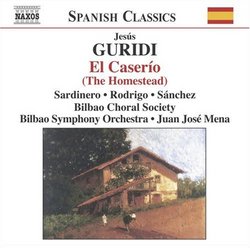| All Artists: Vicente Sardinero, Jesus Guridi, Bilbao Symphony Orchestra, Ana Rodrigo, Maria José Suarez, Emilio Sanchez, Fernando Latorre, Felipe Nieto Title: Jesús Guridi: El Caserío (The Homestead) Members Wishing: 0 Total Copies: 0 Label: Naxos Original Release Date: 1/1/2006 Re-Release Date: 6/20/2006 Genre: Classical Style: Opera & Classical Vocal Number of Discs: 1 SwapaCD Credits: 1 UPC: 747313263226 |
Search - Vicente Sardinero, Jesus Guridi, Bilbao Symphony Orchestra :: Jesús Guridi: El Caserío (The Homestead)
 | Vicente Sardinero, Jesus Guridi, Bilbao Symphony Orchestra Jesús Guridi: El Caserío (The Homestead) Genre: Classical |
Larger Image |
CD Details |
CD ReviewsA Basque Zarzuela Full of Lovely Melody and Catchy Dance Rhy J Scott Morrison | Middlebury VT, USA | 07/13/2006 (5 out of 5 stars) "The music of Jesús Guridi (1886-1961) has been a real discovery for me in the past few years. This recording of his 1926 zarzuela 'El Caserío' ('The Homestead') increases my enjoyment of his always tuneful and skillfully orchestrated music by adding the one of his theatrical works to Naxos's Spanish Classics series. This three-act zarzuela is the first of several Guridi wrote to Spanish (as opposed to Basque) libretti but on Basque themes. The story is a kind of 'Meistersinger' set in a fictional Basque village. Santi, an aging homestead-owner, a kind of Hans Sachs, loves his niece Ana Mari, the daughter of his long-dead love who had instead married one of Santi's brothers. She, too, loves her uncle and would indeed marry him except that she is secretly in love with her cousin, the profligate charmer José Miguel, who initially is not interested in her. As the plot proceeds José Miguel comes to recognize that he loves Ana Mari, Santi renounces his claim on his niece and all ends well.
This zarzuela contains much folk-music, both real and that composed by Guridi, and much of it is in the quintessential Basque 5/8 rhythms of the 'zortziko' and includes an 'espatadantza' (Basque sword dance). The prelude to Act II is particularly effective containing, as it does, all the work's main themes. There is a particularly affecting aria by Santi, 'Sasibill, mi caserío' ('Sasibill, my homestead') in which he sings of his love for his ancestral home. It is reprised in the finale. Another aria, sometimes excerpted from the opera, is 'Yo no sé que veo en Ana Mari' ('I don't know what I see in Ana Mari') in which José Miguel suddenly recognizes that he is in love with his cousin Ana Mari. Emilio Sánchez, singing José Miguel, has a virile baritonal tenor that is quite effective. Ana Rodrigo's Ana Mari is lyrical and lovely if occasionally strained on top. It is a real pleasure to have the wise portrayal of Santi by one of the long-time mainstays of Spanish opera, baritone Vicente Sardinero, who unfortunately died not long after this recording was made in 2001. The secondary parts are well-taken and the chorus, so important in this zarzuela's folk setting, is the excellent Sociedad Coral de Bilbao. Not enough good can be said for the orchestral accompaniment by the Orquesta Sinfónica de Bilbao under the flexible conducting of Juan José Mena, who has conducted others in the Naxos series of recordings of Guridi's music. I can recommend this CD even for someone who has no idea what the music of Guridi might sound like because it is unfailingly melodic, rhythmically alive, full of local color and fine singing. I earlier compared it thematically to 'Die Meistersinger' (there's even a poetry contest -- rather than a singing contest as in 'Meistersinger' but of course the poetry is sung!) but otherwise it is probably closest in its use of folk song and folkways as well as nationalistic fervor to 'The Bartered Bride.' I've been humming bits of it for days. Scott Morrison" |
